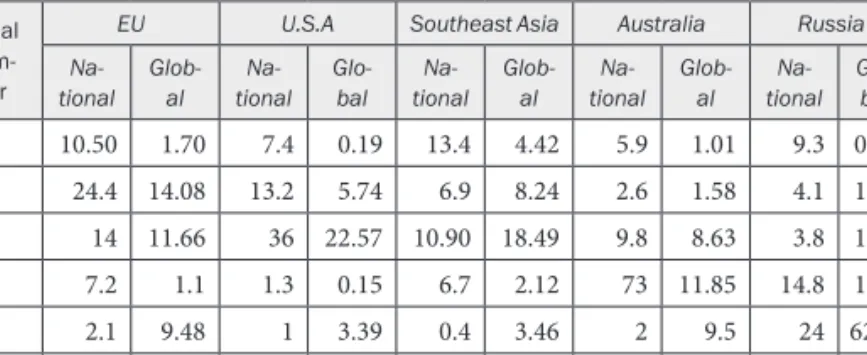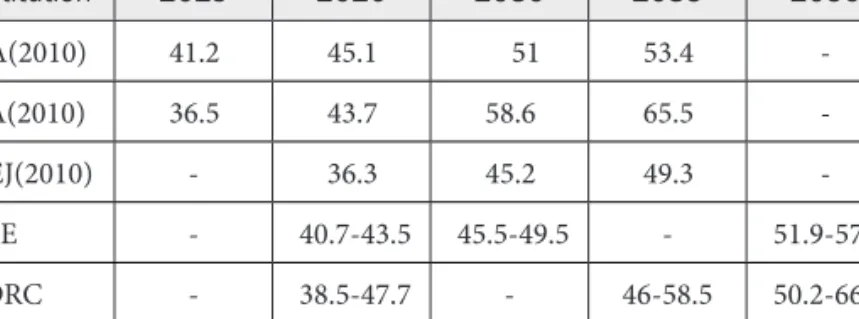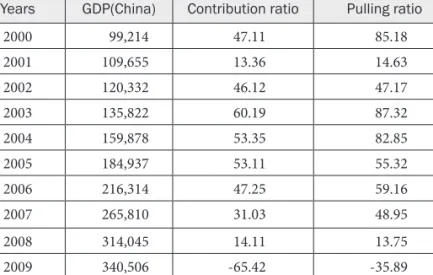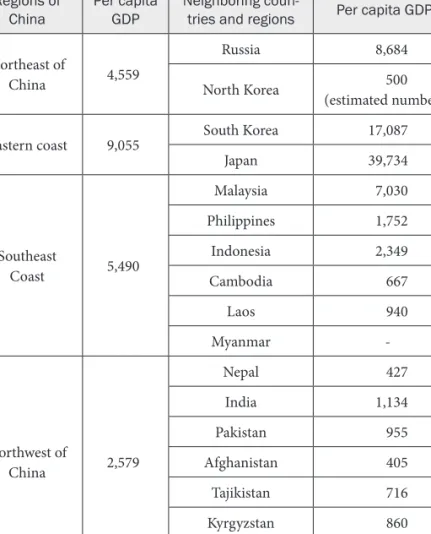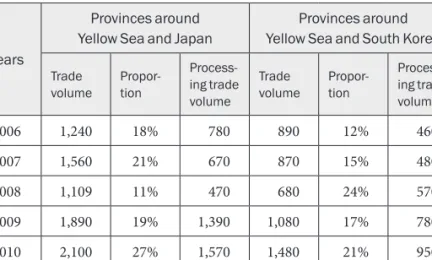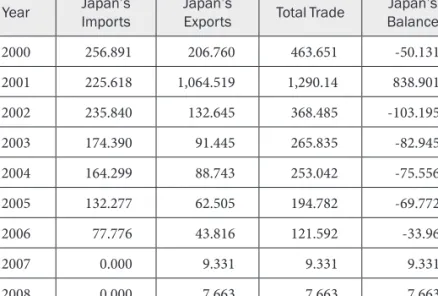그러나 이 책은 아시아·태평양 지역은 물론 4개국 학자들의 견해를 담고 있다. 한반도 분단의 비용과 남북통일에 대한 동북아 4개국의 태도. 한반도 통일과 동북아 경제안보공동체 구축의 수혜를 입는다.
The North Korean policies of the four Northeast Asian powers (i.e., the United States, Japan, China, and Russia) are no exception.
The Costs of Korean Division and the Benefits of Korean Unification for U.S
Asia and affect the security of the United States depends on its nature and timing. Cossa, et al., The United States and the Asia-Pacific Region: Security Strategy for the Obama Administration. What the United States has so far not decided to do is actively work on regime replacement in North Korea.
Joint Vision for the Alliance of the United States of America and the Republic of Korea.” June 16, 2009.
Economic Implications for the United States of the Divided Korean Peninsula
S. Economic Linkages with a United Korea
Before the division of Korea, it would have been difficult to find more disparate economies than that of the US. And due to the lack of trade or any other form of economic transactions, North Korean wages are still only around 2 percent. Although it was much smaller to begin with, integrating the North Korean economy into that deal, no matter how poor the economy is, would have a much more positive impact on the US.
Defense Department accounting makes it impossible to separate US costs related to North Korea 15_ Dale Bremmer and Randy Kesselring, "The Impact of Defense Spending on GDP: The Case of North America." Presented under "Topics in Economics". If the unification was not peaceful, or if it resulted in long-term destabilization of the entire Korean economy, the price would be much higher, probably much higher than the cost of the wars in Iraq and Afghanistan to the US.
At worst, East Asia could turn, as it did 100 years ago, from a peaceful part of the world to an unstable part of the world. I would expect a major controversy in Korea to arise over Korean participation in the US-led Trans-Pacific Partnership. North Korea includes conventional, nuclear, and potential terrorist threats and thus fuels almost all aspects of US spending.
But if we imagine a little, these gains and losses are still far away. The Impact of Defense Expenditures on GDP: The Case of North America.” Presented during the “Topics in Economics” session at the 49th Annual Conference of the Western Social Science Association, Alberta, Canada.
Korean Peninsula Division/Unifica- tion and China: From the Security
These concerns are not entirely unfounded, as China is theoretically North Korea's only ally in the world. In the wake of the passing of the Cold War era and China's normalization of South Korea, China's relations with North Korea have undergone a marked transition. China clearly opposes North Korea's nuclear program; and China also disapproves of North Korea's closed-door policy.
Therefore, North Korea has become a burden to China diplomatically, which hinders China's efforts to solve the problem of Korean nuclear weapons. When North Korea has stubbornly taken provocative actions and carried out blatant nuclear tests, the US benefits of South Korea and China in the unification of the Korean Peninsula A large number of South Korean scholars argue that North Korea is a buffer zone for China and that it is not in the interests of Bei-.
It is widely accepted in the international community that “China is North Korea's most important ally; largest trading partner; and the main source of food, weapons and fuel. However, if unification could be realized in the near future, the aforementioned dispute between China and other countries about economic sanctions against North Korea would end, of course, and China would be freed from international pressure. Third, now that China, Japan and South Korea are preparing to negotiate FTAs, if North Korea could be integrated.
Chinese President Jiang Ze-Min told a North Korean delegation that China would support efforts by North and South Korea to improve relations. What China pays most attention to now are the development of North Korea's nuclear weapons program, the resumption of the six-party talks, and North Korea's recalcitrant behavior.
Korean Peninsula Division/Unifica- tion and China: From the Economic
It advocates the unification of the Korean Peninsula through peace, reconciliation and cooperation. As one of the major powers in the Asia-Pacific region, China's support for the independent and peaceful reunification of the Korean Peninsula is unwavering. Second, since foreign trade is an important driving force for China's economy, the reunification of the Korean Peninsula would play a fundamental role in China's economic growth.
First, the unification of the Korean Peninsula would greatly accelerate the formation of the economic circle around the Yellow Sea. Secondly, from the perspective of the regional economy, there is a spillover effect in the process. The reunification of the Korean Peninsula is indispensable for the opening of the fourth Eurasia bridge30 to traffic.
China's Position on the Unification of the Korean Peninsula The division of the two Koreas is the unfortunate result of historical development. China's security on the periphery is largely determined by the stability of the Korean Peninsula. Second, China is committed to achieving peaceful reunification on the Korean Peninsula through the joint efforts of relevant parties.
Countries should play a key role in ending the division and promoting the reunification of the Korean Peninsula. 40_ Fengjun Chen, “The Strategic Significance of the Korean Peninsula in the 21st Century,” International Political Studies, no.

Korean Peninsula Division/Unifica- tion: From the Security Perspective of Japan
The Japanese people's concern about the situation on the Korean Peninsula became greater after the end of the Cold War, due to North Korea's development of nuclear weapons and medium- and long-range missiles under Pyongyang's "military first" doctrine. . In conclusion, I will argue that the trilateral cooperation that exists between the US, Japan, and South Korea is necessary to achieve a successful unification of the Korean Peninsula. The North Korean Military Threat as a Cost Driver of the Division of the Korean Peninsula.
Since the end of the Cold War, the North Korean military threat has imposed significant costs and risks on Japanese security. 2_ Narushige Michishita, "Japan's Security and the Korean Peninsula," Tatsuo Akaneya and Kotaro Ochiai (eds.), Nihon no Anzen Hosyo (Japanese Security) (Tokyo: Yuhikaku Compact, 2004), p. However, despite Japan's efforts to establish effective defense measures, Japan's responses to a North Korean military threat have many problems.
First, Japan's intelligence gathering capability is not well enough developed to capture information about North Korea's missile launch. Second, while Japan's BMD system is a valuable asset in protecting against the threat of North Korea's ballistic missiles, it is far from perfect. Indeed, Japan's Prime Minister, policy makers or retired officials have occasionally expressed their hope for the unification of the Korean Peninsula, which would bring about the peace and stability of the East Asia region.26 Given North Korea's provocations in 2010 ,.
29_ Hideki Yamaji, Policy Recommendations for Japan: Unification of the Korean Peninsula, The Brookings Institution Center for Northeast Asian Policy Studies, 2004, p. North Korea's hostile intentions against Japan, together with its provocative behavior, increase Japan's threat perceptions.
Costs and Benefits of Korean Unifica- tion for Japan:Political and Economic
This section attempts to focus mainly on the economic aspects of the benefits to Japan of the unification of the Korean Peninsula. Furthermore, hostile relations on the Korean Peninsula have fueled military buildups in both South and North Korea. However, many experts point out that the cost of dividing the Korean Peninsula is higher than that of unification.
The costs of division of the Korean Peninsula and unstable conditions on the Korean Peninsula also apply to Japan to a lesser extent. First of all, instability on the Korean Peninsula is certainly not desirable for Japan's interests. However, in both cases, Japan has to engage in these projects in the process of the unification of the Korean Peninsula.
First, Japan's involvement in the process of Korean unification should contribute to peace and stability on the Korean Peninsula and in Northeast Asia. Second, economic cooperation should be pursued, especially in the northern part of the Korean Peninsula. There are several issues related to the conventional view that Japan does not support the reunification of the Korean Peninsula.
First, the division of the Korean Peninsula certainly caused more costs to Japan. Second, Japan could certainly gain great economic benefits from the unification of the Korean Peninsula.
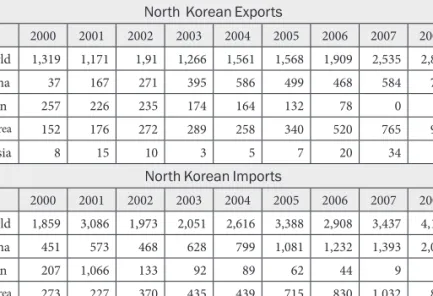
Korean Peninsula Division/Unifica- tion and Russia
The problem is that Russian influence over North Korea can't be exercised much after Moscow starts pursuing. History and geography dictated Russia's vital interest in stability and peace in Korea and prompted it to seek a pragmatic solution to the problem. In 2012, Russia saw the return of Kremlin veteran Vladimir Putin to the presidency.
Some of the lands ceded by the Qing dynasty to the Russian tsars had been held by the Yi dynasty of Joseon Korea since the 15th century. Noktundo was an island in the part of the Tumen River that separated the Russian Maritime Province from the North Korean province of Hamgyeong. 10_ Alexander Ivanov, “The problem of the Noktundo Island in the Media in South Korea”, Zhebin and Asmolov (eds.), Korea: a View from Russia (Moscow, 2007).
The establishment of the DPRK in North Korea in 1948 completely changed the nature of relations between Pyongyang, Beijing and Moscow. Due to the changing course of the Tumen River, the border between North Korea and Russia had to be re-demarcated periodically. North Korea and Iran are designated by Washington as the targets of the missile defense system, although it is clear that the real targets are China and Russia.”17.
Any positive dynamics in the inter-Korean dialogue can thus easily be disrupted by a change in mood in the Pacific Ocean or at the other end of the Eurasian continent. Ivanov, Alexander. “The Noktundo Island Problem in the Media in South Korea.” Zhebin and Asmolov (eds.).
Korean Peninsula Division/Unifica- tion and Russia
